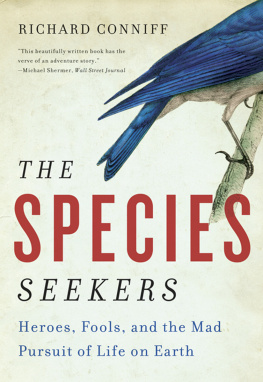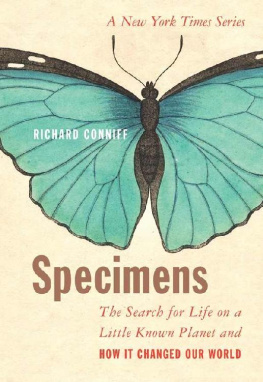Conniff - The species seekers : heroes, fools, and the mad pursuit of life on Earth
Here you can read online Conniff - The species seekers : heroes, fools, and the mad pursuit of life on Earth full text of the book (entire story) in english for free. Download pdf and epub, get meaning, cover and reviews about this ebook. City: New York, year: 2011, publisher: W.W. Norton, genre: Detective and thriller. Description of the work, (preface) as well as reviews are available. Best literature library LitArk.com created for fans of good reading and offers a wide selection of genres:
Romance novel
Science fiction
Adventure
Detective
Science
History
Home and family
Prose
Art
Politics
Computer
Non-fiction
Religion
Business
Children
Humor
Choose a favorite category and find really read worthwhile books. Enjoy immersion in the world of imagination, feel the emotions of the characters or learn something new for yourself, make an fascinating discovery.
- Book:The species seekers : heroes, fools, and the mad pursuit of life on Earth
- Author:
- Publisher:W.W. Norton
- Genre:
- Year:2011
- City:New York
- Rating:3 / 5
- Favourites:Add to favourites
- Your mark:
- 60
- 1
- 2
- 3
- 4
- 5
The species seekers : heroes, fools, and the mad pursuit of life on Earth: summary, description and annotation
We offer to read an annotation, description, summary or preface (depends on what the author of the book "The species seekers : heroes, fools, and the mad pursuit of life on Earth" wrote himself). If you haven't found the necessary information about the book — write in the comments, we will try to find it.
The species seekers : heroes, fools, and the mad pursuit of life on Earth — read online for free the complete book (whole text) full work
Below is the text of the book, divided by pages. System saving the place of the last page read, allows you to conveniently read the book "The species seekers : heroes, fools, and the mad pursuit of life on Earth" online for free, without having to search again every time where you left off. Put a bookmark, and you can go to the page where you finished reading at any time.
Font size:
Interval:
Bookmark:

The Devils Book of Verse: Masters of the Poison Pen from
Ancient Times to the Present Day (editor)
Irish Walls (with photographer Alen MacWeeney)
Spineless Wonders: Strange Tales from the Invertebrate World
Every Creeping Thing: True Tales of Faintly Repulsive Wildlife
Rats: The Good, the Bad, and the Ugly
The Natural History of the Rich: A Field Guide
The Ape in the Corner Office: How to Make Friends,
Win Fights, and Work Smarter by Understanding Human Nature
Swimming with Piranhas at Feeding Time: My Life Doing
Dumb Stuff with Animals

Heroes, Fools, and the Mad Pursuit of Life on Earth

W. W. N ORTON & C OMPANY N EW Y ORK L ONDON
Copyright 2011 by Richard Conniff
All rights reserved
For information about permission to reproduce selections from this book, write to Permissions, W. W. Norton & Company, Inc., 500 Fifth Avenue, New York, NY 10110
Library of Congress Cataloging-in-Publication Data
Conniff, Richard.
The species seekers: heroes, fools, and the mad pursuit of life on Earth / Richard Conniff.
p. cm.
Includes bibliographical references.
ISBN: 978-0-393-08056-8
1. NaturalistsBiography. 2. Natural historyHistory18th century.
3. Life (Biology)ResearchHistory18th century. I. Title.
QH26.C66 2011
508.09033dc22
2010024532
W. W. Norton & Company, Inc.
500 Fifth Avenue, New York, N.Y. 10110
www.wwnorton.com
W. W. Norton & Company Ltd.
Castle House, 75/76 Wells Street, London W1T 3QT
T o those who died in the search for species



STRANGE THINGS, STRANGE LANDS
What raptures must they have felt to land upon countries where every thing was new to them!
REV. W. SHEFFIELD
A T THE HEIGHT of the Battle of Alcaiz on May 23, 1809, as he was about to give the order for a desperate charge by French troops into the center of the Spanish line, Col. P.F.M.A. Dejean happened to glance down. The air around him was thick with gunpowder and blood, but on a flower beside a stream, he saw something unusual. A beetle. Species unknown. He immediately dismounted, collected it, and pinned the specimen to the cork he had glued inside his helmet.
Dejean was a count and a battle-tested leader in the Napoleonic armies. But he was also, above all, a coleopterist, a specialist in beetles. His men knew it because many of them carried glass vials for him and had orders to collect anything on six legs that crawled or flew. His enemies knew it, too, and out of courtesy and respect for the cause of scientific discovery, sent him back vials taken from the dead on the field of battle.
Having collected this latest prize, Dejean swung back up into the saddle and launched the attack. With bayonets fixed, the massed French forces advanced up the slope toward the Spanish artillery. The gap between them slowly closed, everything tense and quiet. Then, at the last moment, the cannons let loose a storm of grapeshot into the faces of the attacking line. Hundreds of French soldiers died. Dejeans helmet was shattered by cannon fire. But he and his specimen survived intact. Years later, he would give his prize from Alcaiz a scientific name, by genus and species, Cebrio ustulatus.
To modern readers, Dejeans reckless passion for beetles in the face of enemy fire may well sound insane. There are probably several million beetle species in the world, and even in that species-besotted era, there was little prospect of glory in adding one more to the list. As it turned out, Dejean would not even get credit for his discovery. By the time he got around to describing his prize from Alcaiz years later, some other naturalist had already found the species and recorded it in a scholarly journal. Under the rules of scientific discovery, this reduced Dejeans proposed name to a synonym, an also-ran. In any case, both naturalists were soon forgotten, along with their beetle.
And yet glory and wonder were everywhere in the air then.
Dejean and like-minded naturalists were fanning out across the globe to play their part in a fabulous adventure story. They regarded the hunt for new species as one of the great intellectual quests in human history, and with good reason. At the start, naturalists knew no more than a few thousand species, and often had the basic facts wrong. Even educated people still inhabited a jabberwocky world in which monsters abounded, and one species could slide uncertainly into another. Our own ancestors, just eight or ten generations ago, still thought that dog-headed humans lived in distant lands, probably based on early descriptions of baboons. When the fossil skeleton of a giant salamander turned up, a learned Swiss physician identified it as a sinner drowned in Noahs Flood. Naturalists then could not even clearly distinguish some plants from animals and passionately debated whether one could transform into the other, and back again. (Its a measure of the state of knowledge then that they thought of themselves simply as naturalists or natural philosophers. The words scientist and biologist did not yet exist.)

As the great age of discovery began, bestiary creatures still haunted human minds.
That would all change, as a small band of explorers set out to break through the mystery and confusion. The great age of discovery about the natural world was a period of less than 200 years, from the eighteenth century into the twentieth. It got its start in 1735, when the Swedish botanist Carolus Linnaeus invented a system for identifying and classifying species. He was a charismatic teacher, both ribald and full of religious fervor for the wonders of the natural world. His words inspired 19 of his own students to undertake voyages of exploration. Half of these apostles, as he called them, would die overseas in the service of his mission. Explorers from other nations, also inspired by Linnaeus, soon followed, taking the hunt for new species to the farthest ends of the Earth. They made the discovery of species one of the most important and enduring achievements of the colonial era.
That word discovery may stick momentarily in the modern readers craw. Local people had often known many of these new species for thousands of years and in far more intimate detail than any newcomer could hope to achieve. But done properly, the process of collecting a species and describing it in scientific terms made that knowledge available everywhere. Making it available in Europe was, to be sure, the primary objective. But in the process, the species seekers introduced humanity for the first time to our fellow travelers on this planet, from beetles to blue-footed boobies. And gradually we stumbled from the security of a world centered on our species, created for our comfort and salvation, to a world in which we are one among many species.
Font size:
Interval:
Bookmark:
Similar books «The species seekers : heroes, fools, and the mad pursuit of life on Earth»
Look at similar books to The species seekers : heroes, fools, and the mad pursuit of life on Earth. We have selected literature similar in name and meaning in the hope of providing readers with more options to find new, interesting, not yet read works.
Discussion, reviews of the book The species seekers : heroes, fools, and the mad pursuit of life on Earth and just readers' own opinions. Leave your comments, write what you think about the work, its meaning or the main characters. Specify what exactly you liked and what you didn't like, and why you think so.









